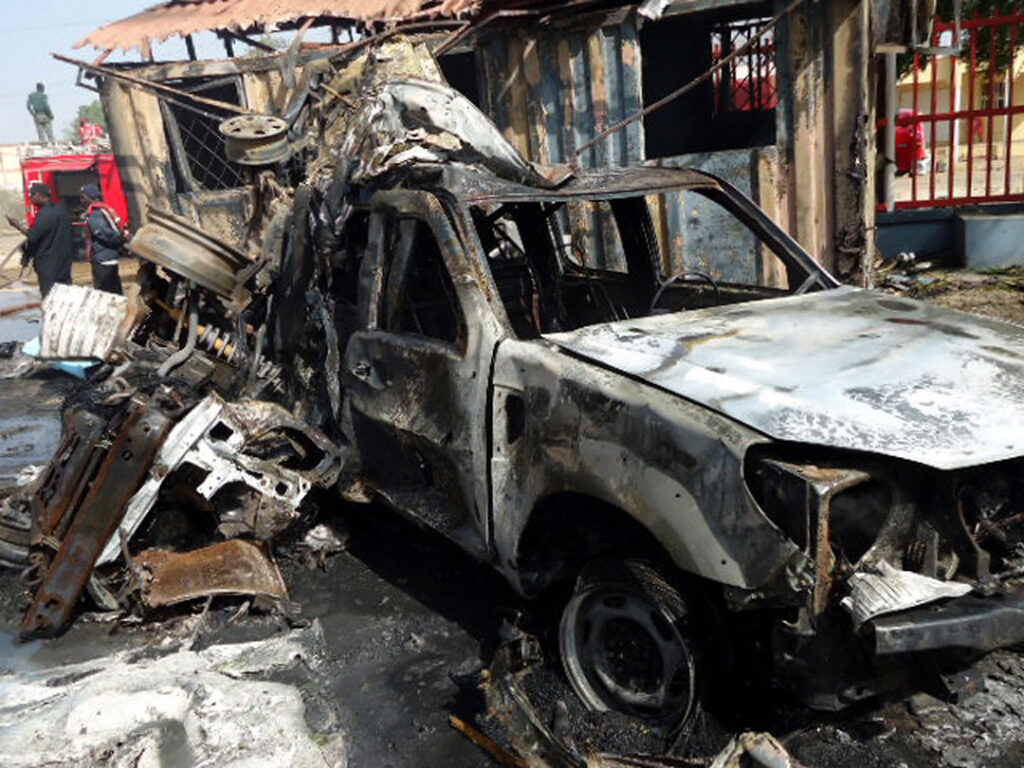ADF STAFF
A loss of territory and manpower have resulted in Boko Haram and the Islamic State West Africa Province (ISWAP) unleashing suicide attacks in Nigeria, analysts say.
On one day in late June, three suicide bombers, each female, killed 32 people and wounded at least 42 at three locations in Gwoza, Borno State, near the Cameroonian border: at a wedding celebration, near a hospital and at a funeral service for victims of an earlier bombing. A fourth incident involved no casualties other than the female bomber.
They were the first suicide bombings in northeast Nigeria in about four years. Gwoza formerly was controlled by Boko Haram, although no terror groups claimed responsibility for the attacks. The town is near Chibok, where Boko Haram infamously abducted 276 schoolgirls in 2014.
Sani Usman, a retired general and counterterrorism fellow at the Nigerian Army Resource Centre Abuja, told Anadolu Agency that almost 65% of Boko Haram’s military experts have been killed, pressuring the group to demonstrate their relevance through suicide bombings.
Security analyst Chidi Omeje agreed, saying the bombings also show that the terrorists are searching for different strategies.
“The terrorists are now in a very tight corner,” Omeje told Nigeria’s Business Day newspaper. “Once they lose ground, they resort to such tactics. They are reverting to these methods because they lack the capability to confront the military directly, so they are targeting soft targets through conscription.”
Al Chukwuma Okoli, an associate professor of political science at Nigeria’s Federal University of Lafia wrote in The Conversation that the suicide attacks also may be a form of strategic communication or messaging.
“Suicide terrorism is considered effective not only because of its lethality,” Okoli wrote. “It is also believed to be sending a message that the cause being fought by the terrorists is so dire that death is a better outcome than life for the terrorist.”
Part of the strategic message aims to heighten public fear and counter the government’s narrative that it is winning the war against terrorism, according to Okoli.
Female Bombers Arouse Less Suspicion
Studies have found that Boko Haram used more women as suicide bombers than any other terror group in history, and recent numbers suggest that more than half of all suicide bombers used by the group are female, the BBC reported.
The bombers in the three recent attacks included one woman who held a baby. War journalist Abba Kakami said the group considers women critical to their mission.
“This is why they often kidnap women, girls not only for procreation but for human shields and suicide attacks,” Kakami told Anadolu Agency. Boko Haram believes in kidnapping girls and marrying them to produce children to sustain their mission, Kakami added.
Experts say terror groups often use women as suicide bombers because they consider them less valuable to the organization but more strategically advantageous.
“The women arouse less [suspicion], and they are able to penetrate targets more deeply,” Mia Bloom, a professor of communication at Georgia State University and an expert on female suicide bombers, told The New York Times.
Women are used, often against their will, in suicide bombings targeting civilians or civic infrastructure, because they blend in and are less likely to be seen as threats, said Bloom, who has interviewed many survivors of Boko Haram.
Many of the women Boko Haram uses as suicide bombers probably have been sexually assaulted and are traumatized, and some truly might be radicalized, Bloom said.
Calls for Security Improvements
In the aftermath of the suicide bombings, the Nigerian Senate argued that military deployment alone was ineffective against terrorism and urged the federal government to employ technology and scientific tactics, Business Day reported.
Mike Ejiofor, former director of the Department of State Security Service, told the newspaper that members of local communities also should help security forces gather information about what terrorists are doing because they better understand the area and its people.
Okoli contended in The Conversation that terrorists’ capacity to commit suicide bombings also can be addressed by denying them access to sites, resources and recruits, and by clearing their operational bases and hideouts. He called for better crowd control and safety at public events.
“Citizens should be advised about how to detect and prevent suicide terror attacks in crowded situations,” Okoli wrote.

